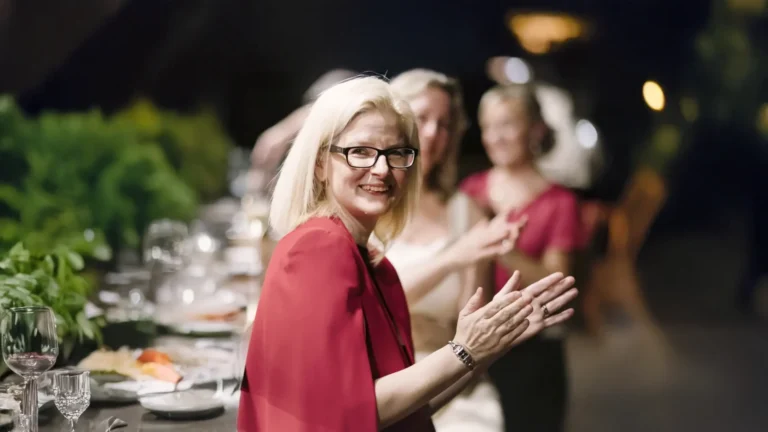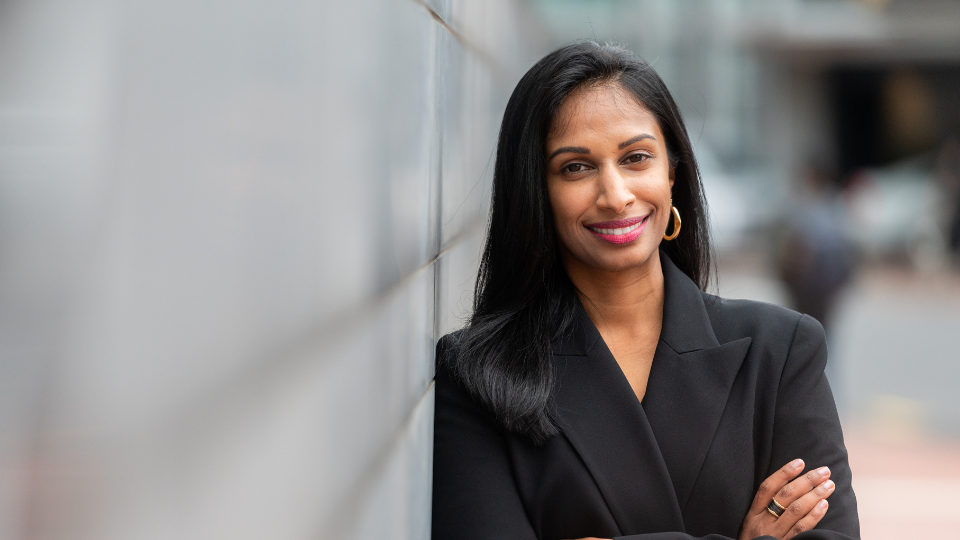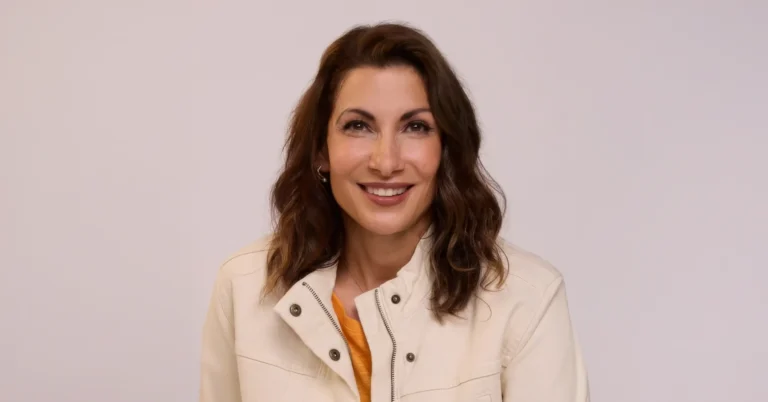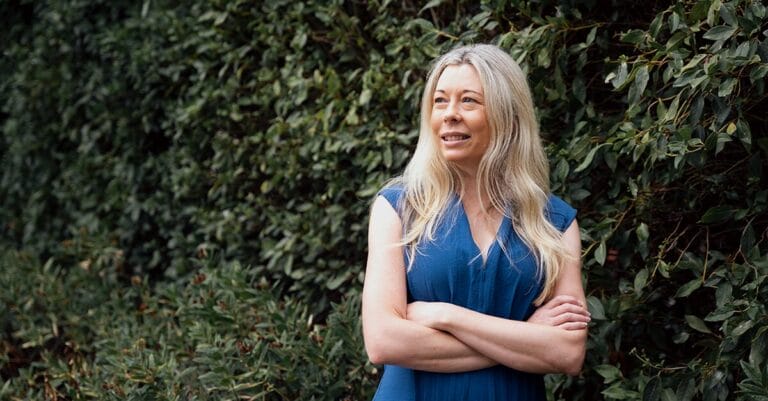

I watched too much Boston Legal in my day and law, according to TV, seemed exciting. I’ve learned it’s not like that in real life. Growing up, I was science focused but I also loved art, design and photography. I wanted to explore this further but fell into the trap of assuming I needed to study something that guaranteed a paying job. I went into law because I wanted a change. I liked the opportunity it gave me to think analytically and present different points of view. There’s a lot of grey space in the law; you have to find answers within the grey and translate that to the business or your client in a way that enables them to take action. I saw that as a lawyer I could be the conduit between theory and practical application to help businesses get better outcomes.
Definitely the latter. The holistic side of success is being fulfilled in what you’re doing, personally and professionally – it’s knowing your ‘why?’. The professional bucket is a significant component of our life as we spend all day at work. If I’m unhappy professionally, that will impact my personal life.
To me, success is having a voice at the right table. It’s inclusiveness – both having a sense of belonging and being able to open channels of inclusiveness for others. My lived experience as lawyer wasn’t always great. When you reach a position of influence, there’s opportunity to speak up, give back and do things the way you wish you experienced them. I see a lot of vulnerability in people entering the legal profession today, particularly due to a tough economic and disruptive environment. I want to support young lawyers, particularly those from diverse backgrounds, to give them the resilience to keep going through all the ups and downs of life.
Success is not about a title or the size of a deal. Continuous learning is a huge part of success for me. You learn so much when you become a lawyer, but equally important is unlearning things that are no longer relevant and re-learning different ways of doing things.
I have an appetite for change, and I tend to naturally embrace innovation and disruption. I’m fairly comfortable navigating new environments and tackling challenges. Having moved around a lot while I was growing up and then travelling and working across different jurisdictions and cultures helped me develop my ‘cultural competency’ as I learned about different ways of doing business. I love being an in-house lawyer and believe in-house success depends on your EQ (emotional intelligence), soft skills and the UX (user experience) you give your stakeholders, especially in leadership roles.
I’ve been in GC roles for quite a while now. Rather than focusing on the title, I look at what I am contributing and learning to gauge if the role is relevant to my professional development. I get satisfaction from being in an engaging environment, a culture I enjoy, working with talented teams and continuously learning. Being in an environment that fosters innovation and creativity is just as important as the role to me. Being in-house, I’ve learned so much about business development, technology adoption, continuous improvement, relationship building and governance from different stakeholders I’ve worked with. It all comes back to relationships. As humans, despite all the AI and tech we use, we get our energy from others.
Moving industries allows me to learn regardless of my job title. In FMCG, I loved learning about different consumer products, markets and supply chain. In the coffee industry, I learned about the bean-to-cup process and the product lifecycle from coffee farms to retail outlets. The education and tech sector taught me about the importance of offering a seamless digital experience and intuitive SaaS products, while working for a regulator provided insights into governance, culture and compliance. Professional services has been a whole different ball game, so it’s all about being open-minded and willing to learn.
It’s one thing to bet on yourself and another to be able to communicate that to your next employer and say, ‘this is my journey, my story and this is how I can deliver what you want’. It’s not always easy. For instance, when I decided to move back to New Zealand after 14 years in Australia, I wanted to be closer to my family, but I was nervous about leaving a terrific role, and a great network in Sydney. It was a hard decision, but a good friend said I needed to back myself and know my past experience would help me adapt to the next challenge. It took time, but I did make the move, and it’s been good so far!
I do now but it’s taken a while to realize the importance of this. It’s an essential part of what success looks like to me. When I was a M&A and private equity lawyer in private practice, I worked very long hours. I loved the work, but I would get very few weekends off a year and that wasn’t sustainable. We were trained to think that is what you do – sacrifice wellbeing, family events and social gatherings.
Nowadays, things are different; the focus is on people and wellbeing. It’s great there’s so much thought leadership and role-modeling of flexibility. I’m better now at seeing signs of burnout early on. I’m focused on ensuring we create environments that are psychologically safe, supportive and inclusive for our teams. That’s how the legal profession will change. Being vulnerable can be hard, but having honest conversations is crucial.
I’m proactive, I do hunt them out – and not just legal opportunities. It’s important to build your network, to have good relationships, and to give back. I’ve been lucky to have had some great mentors and I’ve mentored other lawyers throughout my in-house career. Prioritizing relationships is important, many of the roles I’ve got have been from people referring me or connecting me with a potential employer.
It can be hard, pioneering conversation or inviting someone you respect professionally for a coffee. But the worst that can happen is people say no.
When I don’t feel I’m learning, I feel I’ve delivered everything I can or it’s no longer the right environment. Moving isn’t a bad thing, it’s good for the business to get a fresh pair of eyes, and it’s healthy to diversify your skillset by entering a different industry or stepping up to a new challenge. If you don’t feel you’re learning new things, you need to change the room you’re in.
I hope when people come to me with a legal, business or other problem, they feel supported and have a good user experience. It comes back to being that trusted advisor who can help navigate a good outcome, supporting people. If you have great relationships with colleagues, you can have difficult conversations more easily and stay friends long after leaving a company.
Very few mistakes can’t be fixed, failure is a critical component of learning, leverage your strengths and embrace what makes you different. Be brave as you can always change paths. There are so many options out there. Be open to things and don’t worry if you didn’t follow the traditional path. You don’t have to start out in large law firms. Be flexible and receptive to other people’s perspectives and viewpoints. See what you can take from others because it opens your eyes to a world of possibilities.
Absolutely, I came to realize that combining my legal skills and passion for technology and business transformation made me better suited to being an in-house lawyer than working in private practice. I seek roles that enable me to learn, contribute, innovate, help others and give back.
I don’t put as much weight on career success; it’s just one part of my life and it’s not the be-all-end-all. It’s much more about continuous learning for me and being exposed to different experiences. I’m grateful for my career path to date – it’s given me opportunities to travel, experience different cultures, meet amazing people and learn lots of different things. Hopefully that will continue!


